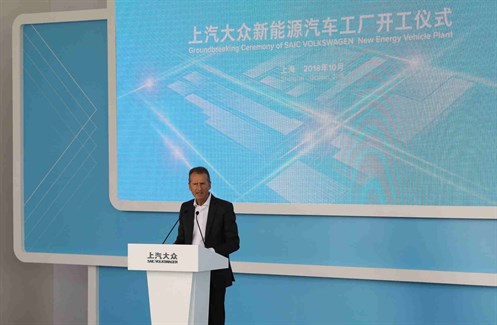When rumours began to circulate in mid-2018 that two titans of the automotive industry were considering a collaboration, few expected the announcement made on the 15 January 2019 to focus so heavily on LCVs.
In broader context, the announcement, made by James Hackett, chief executive of Ford Motor Company, and Herbert Diess, chairman of VW Group, covered a memorandum of understanding to build electric and autonomous vehicles together as well as explore economies of scale opportunities. More specifically, Ford is to design and build medium-sized pick-ups and larger vans while VW will take the lead on a smaller van.
It is, said Hackett, a partnership that will “herald a whole host of new technologies”. It comes at a time of extreme pressure for all manufacturers in the wake of tougher emissions standards and growing impetus for EVs. The fall-out from ‘Dieselgate’ may also have had some bearing on this partnership. Development costs and the timescales needed to bring products to market to remain competitive must also be factored in.
“It’s my opinion that you can’t do this alone,” said Hackett, explaining that the alliance will see equal numbers of representatives from both firms overseeing the operations and strategy of the collaboration and will not involve any cross ownership.
“I want to emphasise simplicity and speed here. With balanced rights and responsibilities, our focus will be on significantly improving the competitiveness of both companies.”
There is no doubting that the alliance could be enormously important for both manufacturers. Diess even went so far as to say the “alliance is visionary”, and that the collaboration will explore avenues that will be “pivotal for future success in the auto industry” while underlining that “our industry is undergoing fundamental change resulting from widespread electrification, ever stricter emission regulation, digitalisation, the shift towards autonomous driving and, not the least, changing customer preferences.”
Diess also cited the relative strengths of the brands with Volkswagen’s market leadership in Europe and China as well as Ford’s dominance in the United States. For Volkswagen, it’s believed a friendly ally on the ground in the US would help ease any regulatory issues around autonomous driving.
The main focus of the announcement, however, was around commercial vehicles and Diess said the alliance would greatly benefit both brands in this area.
“Our envisaged light commercial vehicle alliance creates the strongest player in this segment and it fits into our overall strategy to join forces with strong partners for specific topics,” he said.
“It will improve our competitiveness globally. I believe that the same is true for Ford. We both will be able to shape the future of mobility when joining forces in an intelligent way in LCVs and maybe beyond.”

Herbert Diess, VW chairman
Neither executive would be drawn on the exact plans for production facilities but Hackett confirmed the current thinking is that existing facilities would be used without incurring any staff losses. Ford’s Transit plant in Kocaeli, Turkey, which builds the Transit, Transit Custom and Courier models, and VW’s facility in Poznan, Poland, would both be affected by the alliance, with Diess confirming the Turkey plant is an option for building VW’s next generation of mid-sized vans.
“For Ford, to be very specific, we’re not getting into details about manufacturing locations but obviously the van, city van and one-tonne Transit, iconic vehicles, especially the Transit, would be for Europe only,” said Hackett.
For pick-up trucks the strategy appears to be much wider, with Europe, Africa and South America all highlighted as destinations for the proposed new joint-platform vehicle that would likely see a replacement for the VW Amarok in or around 2023.
“When we talk about pick-ups, that would be the successor of the Amarok. We would share a platform or join the Ford platform in this case. This would be a medium-sized pick-up truck, which would be marketed worldwide, specifically in Latin America, Europe, South Africa and potentially in the United States,” Diess said.
James Farley, Ford Motors executive VP and president of global markets, added: “Obviously, the go-to market strategy for both products would be unique to each brand. So, you can expect, whether it’s a city van or the Transit, similar vehicles from both companies, as well as the medium pick-ups – they will have their own unique brand identity and we’ll have our own unique go-to market strategy through our own networks.”
Hackett added they would have distinctive driving dynamics and different “human interface and interactive experiences”, which is to say that he expects them to be discernibly different and as standalone as the engineering will allow. There is also no intention of dividing up the globe between the two brands, with both still expecting to compete against each other in the segments with their own-badged products.
It may seem premature to reveal the co-operation so far in advance, especially when updated Ford and Volkswagen models will be arriving in the intervening years, but Farley explained the decision was in order to make clear and synchronise the timings of both vans and pick-ups between the two firms. Neither wants to cut short the projected lifespans of vehicles in production or extend their lifespan unnecessarily so that they become outdated.
By working together, Ford and Volkswagen will be at the forefront of the industry. Diess’s assertion it would make them the strongest player in the field is no understatement, and with a combined strategy both brands will be well-placed to become profitable global leaders.
“We didn’t have a clear plan forward on light commercial vehicles,” Diess said. “We are strong worldwide in many segments but this was a problem to solve. And I think we found a solution that is very relevant for both companies with high savings that make both companies future-proof.”
George Barrow is the UK judge for the International Van of the Year, the prestigious prize awarded by leading European LCV journalists.





